| Listing 1 - 10 of 24 | << page >> |
Sort by
|
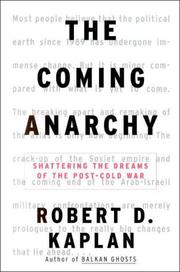
ISBN: 0375503544 Year: 2000 Publisher: New York (N.Y.) : Random House,
Abstract | Keywords | Export | Availability | Bookmark
 Loading...
Loading...Choose an application
- Reference Manager
- EndNote
- RefWorks (Direct export to RefWorks)
Post-communism. --- World politics --- AA / International- internationaal --- 327.0 --- Internationale politiek: algemeenheden. --- Post-communism --- Postcommunism --- Internationale politiek: algemeenheden --- Communism
Book
ISBN: 9780881324242 Year: 2009 Publisher: Washington, D.C. Peterson Institute for International Economics,
Abstract | Keywords | Export | Availability | Bookmark
 Loading...
Loading...Choose an application
- Reference Manager
- EndNote
- RefWorks (Direct export to RefWorks)
Post-communism --- -330.947 --- Postcommunism --- World politics --- CommunismRussia (Federation) --- -Russia (Federation) --- -Russia (Federation) -Economic conditions --- -Economic policy --- -Politics and government --- -Post-communism --- Communism --- Russia (Federation) --- -Economic conditions --- -Politics and government -
Book
ISBN: 9780814705117 9781479841189 1479841188 1479841188 0814705111 Year: 2015 Publisher: New York, NY : New York University Press,
Abstract | Keywords | Export | Availability | Bookmark
 Loading...
Loading...Choose an application
- Reference Manager
- EndNote
- RefWorks (Direct export to RefWorks)
In the early 1990's, Albania, arguably Europe’s most closed and repressive state, began a startling transition out of forty years of self-imposed Communist isolation. Albanians who were not allowed to practice religion, travel abroad, wear jeans, or read “decadent” Western literature began to devour the outside world. They opened cafés, companies, and newspapers. Previously banned rock music blared in the streets. Modern Albania offers a vivid history of the Albanian Communist regime’s fall and the trials and tribulations that led the country to become the state it is today. The book provides an in-depth look at the Communists' last Politburo meetings and the first student revolts, the fall of the Stalinist regime, the outflows of refugees, the crash of the massive pyramid-loan schemes, the war in neighboring Kosovo, and Albania’s relationship with the United States. Fred Abrahams weaves together personal experience from more than twenty years of work in Albania, interviews with key Albanians and foreigners who played a role in the country’s politics since 1990—including former Politburo members, opposition leaders, intelligence agents, diplomats, and founders of the Kosovo Liberation Army—and a close examination of hundreds of previously secret government records from Albania and the United States. A rich, narratively-driven account, Modern Albania gives readers a front-row seat to the dramatic events of the last battle of Cold War Europe.
ALBANIA--POLITICS AND GOVERNMENT --- POST-COMMUNISM--ALBANIA --- DEMOCRACY--ALBANIA --- ALBANIA--HISTORY --- Democracy --- Post-communism --- Self-government --- Political science --- Equality --- Representative government and representation --- Republics --- Postcommunism --- World politics --- Communism --- Albania --- Politics and government
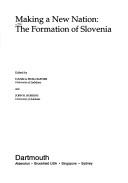
ISBN: 1855216566 Year: 1997 Publisher: Aldershot Dartmouth
Abstract | Keywords | Export | Availability | Bookmark
 Loading...
Loading...Choose an application
- Reference Manager
- EndNote
- RefWorks (Direct export to RefWorks)
Post-communism --- -#SBIB:328H271 --- #SBIB:002.IEB --- Postcommunism --- World politics --- Communism --- Instellingen en beleid: Balkanstaten: Roemenië, Bulgarije, Ex-Joegoslavië, Albanië e.a. --- Slovenia --- History --- -Politics and government --- -Post-communism --- CommunismInstellingen en beleid: Balkanstaten: Roemenië, Bulgarije, Ex-Joegoslavië, Albanië e.a.Slovenia --- SloveniaHistory --- #SBIB:328H271 --- Instellingen en beleid: Balkanstaten: Roemenië, Bulgarije, Ex-Joegoslavië, Albanië e.a --- Politics and government
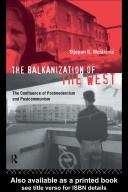
ISBN: 1280063904 9786610063901 0203344642 041524577X 1134882602 9780415245777 9780203344644 9780415087544 0415087546 9780415087551 0415087554 9781134882557 9781134882595 9781134882601 9781138155299 1134882599 Year: 1994 Publisher: London ; New York : Routledge,
Abstract | Keywords | Export | Availability | Bookmark
 Loading...
Loading...Choose an application
- Reference Manager
- EndNote
- RefWorks (Direct export to RefWorks)
Passionate, vigorous and uncompromising this book takes the lid off the confused Western response to the Balkan war. The author raises a series of timely and acute questions about the future of postmodernism and postcommunism. The author claims that the Balkan war has de-railed the movement for unification in Europe. The Islamic world has seen that the West is quite willing to bomb Muslim targets, from Iraq to Somalia, but absolutely unwilling to wage a `just war' to save the Bosnian Muslims. He concludes that the Balkan war is a key catalyst in the unravelling of the West.
Post-communism. --- Postmodernism --- World politics --- Yugoslav War, 1991-1995. --- Social aspects. --- North Atlantic Treaty Organization. --- Postcommunism --- War in former Yugoslavia, 1991-1995 --- Yugoslav Conflict, 1991-1995 --- Yugoslav Wars of Secession, 1991-1995 --- North Atlantic treaty organisation --- North Atlantic Treaty Organization --- Communism --- Yugoslav War Crime Trials, Hague, Netherlands, 1994 --- -Social aspects. --- NAVO --- OTAN --- Post-communism --- Yugoslav War, 1991-1995 --- #SBIB:321H30 --- #SBIB:328H271 --- 316.323.9 --- 316.323.9 Postmoderne maatschappij. Sociologie van het postmodernisme --- Postmoderne maatschappij. Sociologie van het postmodernisme --- -Postcommunism --- Social aspects --- Hedendaagse politieke en sociale theorieën (vanaf de 19de eeuw): algemeen (incl. utilitarisme, burgerschap) --- Instellingen en beleid: Balkanstaten: Roemenië, Bulgarije, Ex-Joegoslavië, Albanië e.a --- NATO. --- Postcommunisme --- Postmodernisme --- Politique mondiale --- Aspect social
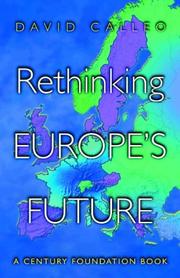
ISBN: 069111367X Year: 2003 Publisher: Princeton (N.J.): Princeton university press
Abstract | Keywords | Export | Availability | Bookmark
 Loading...
Loading...Choose an application
- Reference Manager
- EndNote
- RefWorks (Direct export to RefWorks)
Post-communism --- -European Union --- Security, International --- Nationalism --- -International relations --- 320.94 --- Coexistence --- Foreign affairs --- Foreign policy --- Foreign relations --- Global governance --- Interdependence of nations --- International affairs --- Peaceful coexistence --- World order --- National security --- Sovereignty --- World politics --- Collective security --- International security --- International relations --- Disarmament --- International organization --- Peace --- Consciousness, National --- Identity, National --- National consciousness --- National identity --- Patriotism --- Political science --- Autonomy and independence movements --- Internationalism --- Political messianism --- Postcommunism --- Communism --- Europe --- Council of Europe countries --- Eastern Hemisphere --- Eurasia --- Economic integration. --- -Post-communism --- Foreign relations -
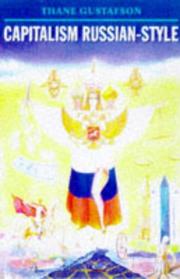
ISBN: 0521645956 0511016697 0521641756 1280420413 0511171900 0511149476 0511309686 051149212X 051105162X 1107116244 9780511016691 9780521641753 9780511492129 6610420416 9786610420414 9780521645959 9781107116245 9780511309687 9780511149474 9780511171901 9781280420412 9780511051623 Year: 1999 Publisher: Cambridge Cambridge University Press
Abstract | Keywords | Export | Availability | Bookmark
 Loading...
Loading...Choose an application
- Reference Manager
- EndNote
- RefWorks (Direct export to RefWorks)
For a decade Russia has been dismantling communism and building capitalism. Describing a deeply flawed fledgling market economy, Capitalism Russian-Style provides a progress report on one of the most important economic experiments going on in the world today. It describes Russian achievements in building private banks and companies, stock exchanges, new laws and law courts. It analyzes the role of the mafia, the rise of new financial empires, entrepreneurs and business tycoons, and the shrinking Russian state. Thane Gustafson tells how the Soviet system was dismantled and the new market society was born. He argues that this new society is changing constantly, so that any assessment of success and failure would be premature. Identifying investment as vital to preserving Russia's status as a major industrial power, in his final chapter he examines the prospects for an economic miracle in Russia in the twenty-first century.
Capitalism --- -Post-communism --- -#SBIB:328H262 --- #SBIB:35H435 --- Postcommunism --- World politics --- Communism --- Market economy --- Economics --- Profit --- Capital --- Instellingen en beleid: Rusland en het GOS --- Beleidssectoren: economisch en werkgelegenheidsbeleid --- Russia (Federation) --- -Russia (Federation) --- -Economic conditions --- -Social conditions --- -Capitalism. --- Post-communism. --- Economic History --- Economic order --- Economic conditions. Economic development --- Russia --- Capitalism. --- Post-communism --- Economic conditions --- Social conditions --- Social Sciences --- Political Science --- #SBIB:328H262 --- Capitalism - Russia (Federation) --- Post-communism - Russia (Federation)
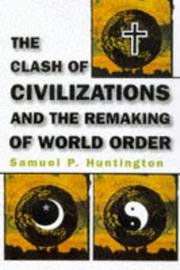
ISBN: 0684811642 9780684811642 Year: 1996 Publisher: New York Simon & Schuster
Abstract | Keywords | Export | Availability | Bookmark
 Loading...
Loading...Choose an application
- Reference Manager
- EndNote
- RefWorks (Direct export to RefWorks)
684-81164-2
World politics --- Post-communism --- Civilization, Modern --- Politique mondiale --- Postcommunisme --- Civilisation --- International relations. Foreign policy --- culture --- demographie --- economie --- histoire politique --- international --- politique --- religion --- 339 --- internationale politiek --- politiek --- #SBIB:327.1H20 --- #SBIB:327.7H01 --- #SBIB:AANKOOP --- 008 --- 327 --- Postcommunism --- Communism --- cultuur --- demografie --- politieke geschiedenis --- internationaal --- godsdienst --- internationale politiek en supranationale politieke organen --- Sociologie van de internationale betrekkingen: algemeen --- Grondslagen, principes, evolutie internationale gemeenschap --- Beschaving --- Internationale politiek. Buitenlandse politiek --- Samenleving --- Politiek --- Geschiedenis --- Geneeskunde --- Techniek (wetenschap) --- Atlas --- Museum --- Maatschappij --- Film --- World politics - 1989 --- -Post-communism --- Civilization, Modern - 1950 --- -Politique mondiale - 1989 --- -Postcommunisme --- Civilisation - 1950 --- -Civilization, Modern
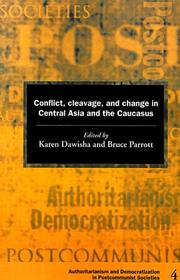
ISBN: 0521597315 0521592461 9780521592468 9780521597319 9780511559204 0511559208 Year: 1997 Volume: 4 Publisher: Cambridge: Cambridge university press,
Abstract | Keywords | Export | Availability | Bookmark
 Loading...
Loading...Choose an application
- Reference Manager
- EndNote
- RefWorks (Direct export to RefWorks)
Edited by two of the world's leading analysts of post communist politics, this book brings together distinguished specialists on the former Soviet states of Central Asia and the Caucasus. Chapters on Kazakhstan, Kyrkyzstan, Tajikistan, Uzbekistan, Turkmenistan, Armenia, Azerbaijan, and Georgia, provide a systematic analysis of elite politics, factionalism, party and interest group formation, and social and ethnic groupings. Karen Dawisha and Bruce Parrott provide theoretical and comparative chapters on post communist political development across the region. This book will provide students and scholars with detailed analysis by leading authorities, plus the latest research data on recent political and economic developments in each country.
Political systems --- anno 1990-1999 --- Central Asia --- Caucasus --- Democracy --- Democratization --- Post-communism --- Asia, Central --- Politics and government --- Politics and government. --- #SBIB:328H262 --- #SBIB:324H70 --- Postcommunism --- World politics --- Communism --- Democratic consolidation --- Democratic transition --- Political science --- New democracies --- Self-government --- Equality --- Representative government and representation --- Republics --- Instellingen en beleid: Rusland en het GOS --- Politieke verandering: algemeen --- Caucasia --- Caucasus Mountains --- Caucasus Region --- Kavkaz --- RepublicsInstellingen en beleid: Rusland en het GOS --- Politieke verandering: algemeenAsia, Central --- KavkazPolitics and government --- Social Sciences --- Political Science --- Democracy - Asia, Central --- Democracy - Caucasus --- Democratization - Asia, Central --- Democratization - Caucasus --- Post-communism - Asia, Central --- Post-communism - Caucasus --- Asia, Central - Politics and government - 1991 --- -Caucasus - Politics and government.

ISBN: 1852784385 9781852784386 Year: 1992 Publisher: Aldershot: Elgar,
Abstract | Keywords | Export | Availability | Bookmark
 Loading...
Loading...Choose an application
- Reference Manager
- EndNote
- RefWorks (Direct export to RefWorks)
Economic order --- Economic conditions. Economic development --- Eastern and Central Europe --- Postcommunisme --- Post-communism --- Europe de l'Est --- Europe, Eastern --- Conditions économiques --- Politique économique --- Economic conditions --- Economic policy --- -EEU / Central & Eastern Europe --- 331.31 --- 330.548 --- 330.540 --- Postcommunism --- World politics --- Communism --- Economisch beleid. --- Nationalisatie. Privatiseringen. --- Socialistische stelsels: algemeenheden. --- East Europe --- Eastern Europe --- -Economic policy --- -Post-communism --- CommunismEconomisch beleid. --- Socialistische stelsels: algemeenheden.Europe, Eastern --- Eastern EuropeEconomic conditions --- -Economic order --- -Postcommunisme --- Conditions économiques --- Politique économique --- EEU / Central & Eastern Europe --- Socialistische stelsels: algemeenheden --- Nationalisatie. Privatiseringen --- Economisch beleid --- Post-communism - Europe, Eastern.
| Listing 1 - 10 of 24 | << page >> |
Sort by
|

 Search
Search Feedback
Feedback About UniCat
About UniCat  Help
Help News
News